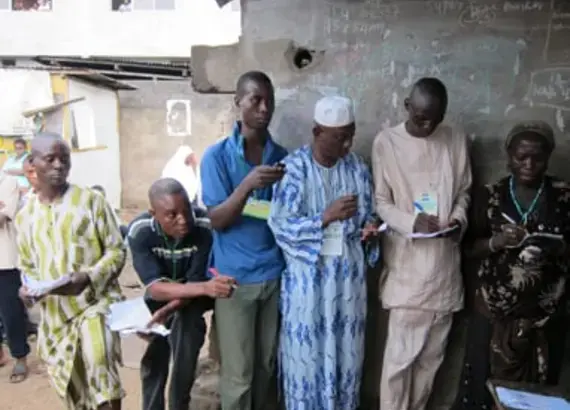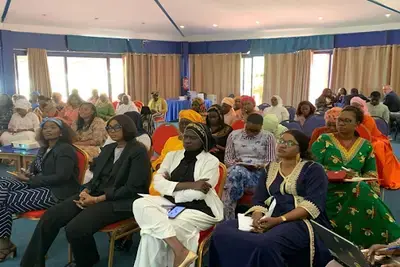
Success Story
Election Commission Head, Observers Highlight Progress and Remaining Challenges in How Nigeria Conducts Elections
Nigeria’s April presidential and parliamentary elections have largely been viewed as a step forward from the seriously flawed polls of the past, with much credit going to the leadership of the Independent National Electoral Commission (INEC).
The INEC chairman, Dr. Attahiru Jega, discussed the accomplishments and challenges faced by the commission at a May 10 Washington, D.C., event organized by NDI along with the Johns Hopkins School of Advanced International Studies (SAIS) and the Center for Strategic and International Studies (CSIS).
Jega addressed the commission’s difficult duties leading up to the elections, which included the massive undertaking of compiling a new registry of 74 million voters, as well as the distribution of election materials to 120,000 polling stations and putting in place measures to curb election day abuses such as double voting and ballot box stuffing.
While recognizing ongoing challenges from stamping out impunity to improving the transmission of election results, Jega commended the effort from the commission, his countrymen and the international community to work toward a credible election process.
“Conducting elections that are free, fair, peaceful and credible in a country such as Nigeria, given its size, large population, terrain and ethno-religious diversity, is a very difficult assignment even under normal circumstances,” Jega said. “Under the far from normal circumstances in which the new INEC had to conduct the 2011 voters’ registration and elections, it seemed and felt like an impossible task. We are gratified by the general acknowledgment and appreciation of the progress made so far.”
Jega’s remarks were preceded by comments from Peter Lewis, SAIS director of African studies, on Nigeria’s electoral process. “This was likely the freest election in Nigerian history,” Lewis said.
In comments after Jega’s speech, Chris Fomunyoh, NDI’s senior associate for Africa, cited four INEC actions that contributed to a sound election:
- INEC’s open door policy and its embrace of Nigerian civil society organizations that monitored the election;
- INEC’s desire to protect the rights of citizens and make their votes count;
- The decision to designate more than 200,000 young university graduates, members of Nigeria’s National Youth Service Corps, to serve as poll workers; and
- The decision to cancel voting on April 2 after INEC discovered that materials had not been delivered to all polling sites.
Fomunyoh credited more than just INEC for a successful election. He praised President Goodluck Jonathan for the statements he made before the election indicating the importance of a good election and his willingness to accept the results regardless of his fortune. Other factors included, he said, “intense engagement by political parties and civil society organizations to safeguard the credibility of the polls, and a heightened commitment and dedication by millions of Nigerian citizens who turned out to vote peacefully on election day.”
During a second panel at the event, nonpartisan analysts, all of whom observed the presidential and parliamentary elections, shared views on the electoral process and its potential impact on Nigeria. The group included several members of NDI’s international observation mission, including Carlo Binda, NDI’s senior resident director in Nigeria; Richard Klein, NDI’s senior advisor for election processes; Jennifer Cooke, director of the Africa program at CSIS; Gwendolyn Mikell, professor of anthropology and foreign service at Georgetown University; and Pauline Baker, president emeritus of the Fund for Peace, who served as moderator. The panel also included Eric Guttschuss, Nigeria researcher at Human Rights Watch.
 Carlo Binda (center), NDI's Nigeria director, speaks during the second panel discussion at SAIS.
Carlo Binda (center), NDI's Nigeria director, speaks during the second panel discussion at SAIS.Binda drilled into election issues in depth, such as the state-level primaries. These polls generated much of the political violence in past elections, but caused less disturbance this time, partly due to INEC’s new role regulating primary contests and greater scrutiny by the media.
“While many early on worried that high expectations would be disappointed and result in widespread action,” Binda said of the election process, “it appears that high expectations encouraged genuine progress and provided committed champions of credible elections with the support to effect positive change.”
The presenters noted that violence did occur in the northern part of Nigeria following the presidential election, saying it tarnished what was otherwise a much improved process.
Klein detailed the efforts of NDI’s partner organization, Project 2011 Swift Count, a citizen monitoring effort that deployed observers throughout the country to observe in a statistical random sample of polling sites. This observation method serves as a citizens’ tool to assess the integrity of voting and counting processes, as it yields statistically accurate results with which to verify the official results.
Klein highlighted a number of problems reported by these observers, but said, “the problems were not systematic and did not fundamentally undermine the credibility of the process.” The Swift Count findings supported the presidential results announced by INEC.
Pictured above: Civil society observers and party poll watchers during April elections
Published May 26, 2011



